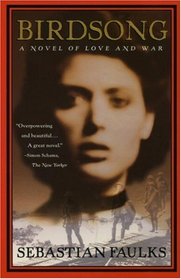Helpful Score: 4
I found this novel to be dissapointing. The relationship between Stephen and Isabelle was more about lust, curiosity, and escape. It was finished before it even began. Most of the story is about the details of WWI, which was fine, but the exaggeration of details made this book drag. Too many characters and not enough character build-up. The ending seemed rushed, therefore, fell flat. The story could have gone along without the character of Elizabeth. Not an impressive novel in my opinion.
Helpful Score: 4
This book has been on my TBR shelf for almost 4 years. I finally decided to read it when I heard that a BBC adaptation of the novel is scheduled to be aired on PBS' Masterpiece. The first part of this was shown last weekend and the conclusion this coming Sunday (I have my DVR set to record). Anyway, I thought the novel was wonderful telling the story of a young British man, Wraysford, who finds love in France prior to WWI. He falls for the wife of a man who he is staying with in France to learn about the fabric trade. Then the novel throws the reader into the midst of the horrors of the Great War. Faulks is very graphic in his descriptions of both love and war. The novel then shifts between the horrors of the trenches to the 1970s and Wraysford's granddaughter who is trying to find out more about her grandfather and what it was like during WWI. Overall, I would highly recommend this novel, especially to anyone interested in learning more about WWI, and I'm looking forward to watching the BBC adaptation.
Helpful Score: 2
the authenticity of the battle descriptions are the most profound
i have ever read..
i have ever read..
Helpful Score: 1
I had heard how raw and honest this book was. I resisted reading it because of the Incomprehensible horrors of war with nothing-held-back descriptions of the trenches. Faulks had me so mesmerized with Charlotte Gray (set in WWII) that I decided to read this WWI novel.
The contrived nature of the romance (clearly sexual) between Stephen and Isabelle Azaire (nine years his senior) didnt hold up to the vivid war story.
There are two narratives: first by Stephen Wraysford, who failed to gain my sympathy, but kept my attention. The second is by Stephens daughter Elizabeth, which didnt make sense until I reached the end of the book. Both the sex and battle scenes are graphic and unsettling, but the book is a wonderful account of what sacrifices were made by those who fought in WWI. Especially interesting are the digging of fighting tunnels and the brave men who dug them. The book will both tear your out heart and grip your soul. It helped me understand why my father told us nothing about his experiences in the artillery of WWII.
"It was not his death that mattered; it was the way the world had been dislocated. It was not all the tens of thousands of deaths that mattered; it was the way they had proved that you could be human yet act in a way that was beyond nature." (p. 225)
No child or future generation will ever know what this was likeWhen it is over we will go quietly among the living and we will not tell themWe will seal what we have seen in the silence of our hearts and no words will reach us. (p. 403) And yet, Sebastian Faulks attempts to tell us.
Reviewed by Holly Weiss, author of Crestmont
The contrived nature of the romance (clearly sexual) between Stephen and Isabelle Azaire (nine years his senior) didnt hold up to the vivid war story.
There are two narratives: first by Stephen Wraysford, who failed to gain my sympathy, but kept my attention. The second is by Stephens daughter Elizabeth, which didnt make sense until I reached the end of the book. Both the sex and battle scenes are graphic and unsettling, but the book is a wonderful account of what sacrifices were made by those who fought in WWI. Especially interesting are the digging of fighting tunnels and the brave men who dug them. The book will both tear your out heart and grip your soul. It helped me understand why my father told us nothing about his experiences in the artillery of WWII.
"It was not his death that mattered; it was the way the world had been dislocated. It was not all the tens of thousands of deaths that mattered; it was the way they had proved that you could be human yet act in a way that was beyond nature." (p. 225)
No child or future generation will ever know what this was likeWhen it is over we will go quietly among the living and we will not tell themWe will seal what we have seen in the silence of our hearts and no words will reach us. (p. 403) And yet, Sebastian Faulks attempts to tell us.
Reviewed by Holly Weiss, author of Crestmont





![header=[] body=[Get a free book credit right now by joining the club and listing 5 books you have and are willing to share with other members!] Help icon](/images/question.gif?v=29befa08)
